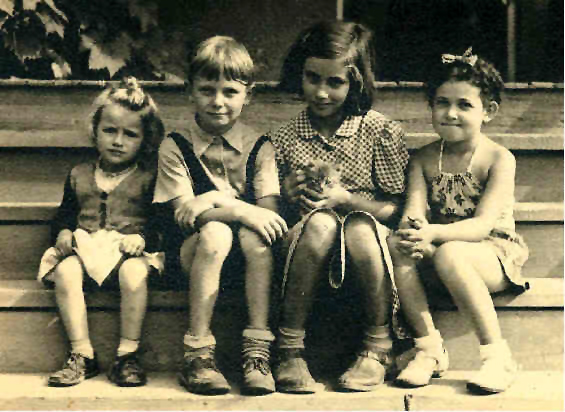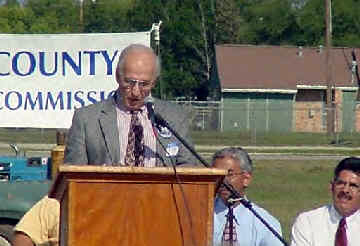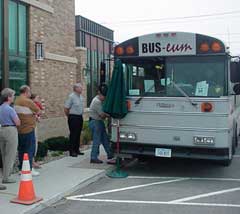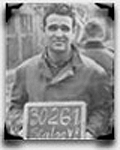29 March-19 April 2010 - various times & locations, Twin Cities/Saint Cloud Metro Areas & Central Minnesota
War and the North Star:
Minnesotans Experience World War II
Two WWII “Witnesses” Return to Minnesota to Tell Their Stories; Mobile Exhibit about Midwest POWs in Nazi Germany tours Central Minnesota
PROGRAM DESCRIPTION PROGRAM SCHEDULE interview with Edith |

Edith Lichtenstein (holding kitten) sits with her brother Louis and two other child refugees at Scattergood Hostel, circa 1942. |
War and the North Star:
Minnesotans Experience World War II
Two WWII “Witnesses” Return to Minnesota to Tell Their Stories; Mobile Exhibit about Midwest POWs in Nazi Germany tours Central Minnesota
Her Jewish father served as a judge in the pre-Nazi Weimar Republic. His father emigrated to Cincinnati, and baked bread. Although both German-born, the perspectives from which these later-American youth, Edith and Eb, saw the rise of Hitler’s dictatorship and the subsequent global war it spawned, could hardly have been more different.
Now respectively a retired educator and former business person, Edith Lichtenstein Morgan and Eberhard Fuhr visited the Twin Cities and St. Cloud-metro area for a week beginning March 29th to speak about their varied experiences, and lessons they have learned from them.
Edith made herself available to meet with interested media from 1-2pm Monday, March 29th, in Conference Room M69 at the co-sponsoring Jewish Historical Society of the Upper Midwest, on the Barry Family Campus, 4330 S Cedar Lake Rd, St Louis Park, MN 55416. Eb was available via phone, pre-program, as well.
Both visitors appeared at several local venues: Edith from 7-9pm Wednesday, March 31st, in the Ballroom of St. Cloud State University’s Atwood Memorial Center, 720 4th Av S; and Eb from 7-9pm Thursday, April 1st, in the Atwood Center’s Voyageurs South Room on the SCSU campus. They also appeared at the Great River Regional Library in St. Cloud, from 10am-5pm Saturday, April 3rd. That day-long event launched an extensive, two-week exhibit and speaking tour around Central Minnesota. This programming was made possible by a Minnesota Historical and Cultural Heritage Grant awarded to the Great River Regional Library system.
Both Edith and Eb have lived in Minnesota, and still have relatives here. They spoke in Central Minnesota as part of a special TRACES-organized Midwest narrative-history WWII project, War and the North Star: Minnesotans Experience WWII. The project features a 32-community tour of the BUS-eum, a mobile museum featuring Behind Barbed Wire: Midwest POWs in Nazi Germany, an exhibit that includes the stories of Minnesota soldiers and airmen held in the Third Reich. Additional exhibits await viewers at various GRRL libraries: details are at www.griver.org.
The programming as well as the speakers viewed Minnesotans’ experiences of the Second World War from diverse perspectives. Only a child, Edith - for one - watched as Hitler’s Brown Shirt regime imprisoned her father numerous times for alleged “crimes” and fled with him, her Bavarian-Lutheran-born mother and newborn brother first to Switzerland, then to France. In June 1940 the family fled again, this time on foot to Limoges, pushing a doll’s baby carriage with their remaining worldly possessions.
After Edith’s father landed in concentration camps in the “free” South of France, a Swiss family donated its life savings to buy passage to “Amerika” for the Lictensteins. Rushing through Spain and Portugal, they landed in New York, where American Quakers sent the Lichtensteins to the Scattergood Hostel near Iowa City. A 10-month rest there led to a post for the former judge at St. Paul’s Macalester College.
While the Lichtensteins endured a dramatic series of travails, the Fuhr family in Ohio underwent their own. Always a patriotic German, Eb’s vocal father and his mother came under suspicion of being “enemy aliens” and were sent to Camp Crystal City, in the Texas desert. Left alone with his older teenage brother, one day during a high school class Federal gun-toting agents appeared, handcuffed Eb and sent him, with the brother, first to a house for other German-American “security threats” and later also to the “family camp” in Texas. There, he witnessed the plights of Germans, Italians and other Europeans held without legal representation or due process, including German South Americans forcibly brought to the US by the Roosevelt administration, and even Jews - some of whom were refugees who had fled the Nazis - and erroneously detained.
The St. Cloud State University Center for Holocaust and Genocide Education and the Jewish Historical Society of the Upper Midwest co-sponsored Edith’s appearances at a number of Twin Cities and St. Cloud venues, and Hoglund Bus of Monticello support the BUS-eum.

Eberhard Fuhr speaks at a commemoration of Camp Crystal City, a German-American civilian internment camp in southwest Texas. Many of those - including American-born children - were forcibly “repatriated” or traded for U.S. nationals held in Nazi Germany.
War and the North Star:
Minnesotans Experience World War II
SCHEDULE AT A GLANCE:
29 March – 19 April 2010
Monday, 29 March
1-2pm press conference with Edith Lichtenstein Morgan; Jewish Historical Society of the Upper Midwest, on the Barry Family Campus, 4330 S Cedar Lake Rd, St Louis Park, MN 55416; contact Katherine Tane at 952.381.3363 or ktane@jhsum.org for questions concerning the JHSUM; contact event organizer MichaelLuickThrams@yahoo.com or 651.373.9673 for other details.
Wednesday, 31 March
mid-day possible Macalester College campus visit
7-9pm presentation by Edith Lichtenstein Morgan; St. Cloud State University’s Atwood Memorial Center, on Central Campus, 720 4th Ave S; sponsored by the SCSU Center for Holocaust and Genocide Education
Thursday, 1 April
7-9pm presentation by Eberhard Fuhr; Atwood Center’s Voyageurs South Room, SCSU campus
Saturday, 3 April
10.30-11am Michael Luick-Thrams showed video about Scattergood Hostel
11am-noon Edith Lichtenstein Morgan spoke about having been a refugee from Nazi-occupied Europe, and her family’s experiences in the Upper Midwest during and after WWII
noon-12.30 Michael Luick-Thrams showed video about German-American civilian internment in the US during WWII
12.30-1.30pm Eberhard Fuhr spoke about the personal interment experiences of Germans, Italians and other Europeans in the US during WWII
2-2.30pm Michael Luick-Thrams showed Scattergood Hostel video
2.30-3.30pm Edith Lichtenstein Morgan spoke about having been a child refugee
3.30-4pm Michael Luick-Thrams showed civilian-internment video
4-5pm Eberhard Fuhr spoke about having been a German-American civilian
CONTACT PERSON:
Beth Ringsmuth Stolpman, Patron Services Specialist, Great River Regional Library
1300 W Saint Germain St, St. Cloud/MN 56301
320.650.2510/cell 420.6451 bethr@grrl.lib.mn.us website www.griver.org
Michael Luick-Thrams delivered the below programs, over the following fortnight, at local branch libraries of the Great River Regional Library system: locations listed at http://www.griver.org/locations-and-hours
1: Out of Hitler’s Reach: The Scattergood Hostel for European Refugees, 1939-43
2: VANISHED: German-American Civilian Internment, 1941-48
3: Behind Barbed Wire: Midwest POWs in Nazi Germany, 1943-45
4: Held in the Heartland: German POWs in the Midwest, 1943-46
Monday, 5 April
10am-4pm St. Michael Public Library
5-8pm Rockford Public Library; Out of Hitler’s Reach program 7-8pm
Tuesday, 6 April
9am-noon Annandale Public Library
2-8pm Buffalo Public Library; VANISHED program 7-8pm
Wednesday, 7 April
9am-noon Sauk Centre Public Library
2-3.30pm Belgrade Public Library
5-7pm Melrose Public Library; Behind Barbed Wire program 6-7pm
Thursday, 8 April
9am-noon Howard Lake Public Library
1-4pm Delano Public Library
5-8pm Cokato Public Library; Held in the Heartland program 7-8pm
Friday, 9 April
10am-1pm Cold Spring Public Library
2-5pm Richmond Public Library
6-9pm Paynesville Public Library; Out of Hitler’s Reach program 7-8pm
Saturday, 10 April
9-10am Kimball Public Library
11am-1pm Big Lake Public Library; Held in the Heartland program noon-1pm
Tuesday, 13 April
9-10.30am Eagle Bend Public Library
11.30am-2.30pm Staples Public Library
5-8pm Long Prairie Public Library, Behind Barbed Wire program 7-8pm
Wednesday, 14 April
9am-noon Albany Public Library
2-5pm Waite Park Public Library
6-8pm Foley Public Library, Out of Hitler’s Reach program 7-8pm
Thursday, 15 April
10-11.30am Clearwater Public Library
2-8pm Monticello Public Library; Behind Barbed Wire program 7-8pm
Friday, 16 April
9am-3pm Elk River Public Library
4-7pm Becker Public Library; VANISHED program 6-7pm
Saturday, 17 April
10am-1pm Pierz Public Library
2.30-5.30pm Little Falls Public Library; Held in the Heartland program 3-4pm
Monday, 19 April
9-10.30am Upsala Public Library
11.30am-1pm Grey Eagle Public Library
2-3.30pm Swanville Public Library
5-6.30pm Royalton Public Library; Out of Hitler’s Reach program 6.30-7.30pm
Tuesday, 20 April
all day Rice Middle School, 901 1st St S, Sauk Rapids; contact Christine Roth 320.654.9073 crothinmn@yahoo.com
-END of Minnesota Tour -
|
War Comes to the Peace Garden:
North Dakotans Remember WWII
Two-Week WWII History Exhibit and Programs follow Day-Long Launch Event at State Capitol Grounds in Bismarck
PROGRAM DESCRIPTION PROGRAM SCHEDULE |

|
25 April - 5 May 2010 - various times & locations in 18 communities across North Dakota
A traveling exhibit that tells the story of North Dakota and other Midwest soldiers and airmen held as prisoners of war (POWs) in Nazi Germany will visit sites throughout North Dakota during late April and early May, coinciding with the 65th anniversary of the end of World War II in Europe.
From April 25 to May 5 exhibits, related programs, guest speakers and other activities in 16 communities across the state will reflect on how World War II affected the American Heartland, and the lasting legacies of the European theater of that global conflict. Although the quiet North Dakota prairies seem a world away from the horrors of war, WWII forever changed the lives of the state's residents, and the role their nation plays in the world.
Starting with a History Marathon at the State Capitol Grounds in Bismarck on Sunday, April 25, the mobile exhibit "Behind Barbed Wire: Midwest POWs in Nazi Germany, 1943-45" will begin a two-week tour around North Dakota; a tour schedule can be found at www.TRACES.org ; click on "programs". Underwritten by a State Historical Society of North Dakota grant and co-sponsored by MiND [Museums in North Dakota] the series "War Comes to the Peace Garden: North Dakotans Reflect on WWII" includes projects to preserve local histories of the era, as well as programming to honor and popularize those stories among those who have followed what some call the Greatest Generation.
In addition to showing the BUS-eum 1 (previews at http://traces.org/buseumscenes.html and http://traces.org/Buseum_1_tour/Buseum_1-video/index.html) at the launch on the 25th, in-depth narrated Power Point programs and related videos - including a 1945 color U.S. Government film of an internment camp in Texas will comprise a "History Marathon" in the North Dakota Heritage Center. Complementing the Sensational Sundays series, St.-Paul-based TRACES Center for History and Culture's Executive Director, Michael Luick-Thrams, will offer four programs that look at mostly unknown North Dakota World War II stories:
12-12:45pm Out of Hitler’s Reach: The Scattergood Hostel for European Refugees, 1939-43
From 1939 to 1943 more than 185 Jewish and other refugees from Nazi-occupied Europe found a safe haven at Scattergood Hostel, a Quaker-run hostel near Iowa City. One of the young Jewish men there, Ernst Solmitz, came to the Dakotas and spent time at a Bruderhof community, as well as spent time on Native-American reservations.
12:45-1:30pm VANISHED: German-American Civilian Internment, 1941-48
From 1941 to 1948 the U.S. Government interned some 15,000 German-American civilians, including women, children and men, as well as Latin-American Germans, including some Jewish refugees who had fled the Nazis. One of these camps stood outside of Bismarck, near the current airport, at then-Fort Lincoln.
2:15-3pm Behind Barbed Wire: Midwest POWs in Nazi Germany, 1943-45
The most American POWs held in the Third Reich - per capita - came from the Upper Midwest. The 34th Division consisted largely of men from Iowa, Minnesota and both Dakotas; some 1,800 of them were captured in February 1943 in North Africa and kept in Nazi Germany for more than two years.
3-3:45pm Held in the Heartland: German POWs in the Midwest, 1943-46
Conversely, the United States housed some 380,000 German and 50,000 Italian prisoners of war (POWs) in over 600 camps - two of which were in Grand Forks and Grafton, North Dakota, as branch camps of the nearest base camp outside of Algona, Iowa.
The larger, state-wide showing of the BUS-eum and repeats of three of those four programs are listed below. In conjunction with the tour, local hosts will be interviewing members of the Greatest Generation, showing displays of their communities' ties to WWII, sponsoring projects by area students, and complementing the overall project in other ways. For more information, visit www.TRACES.org or contact the TRACES staff.
North Dakota-/WWII-Narrative-History Tour
SCHEDULE AT A GLANCE:
25 Apri - 5 May 2010
Sunday, 25 April
BUS-eum 1 exhibit Behind Barbed Wire: Midwest POWs in Nazi Germany, 1943-45 showing 10am-4pm; four programs:
12-12:45pm Out of Hitler’s Reach: The Scattergood Hostel for European Refugees, 1939-43
12:45-1:30pm VANISHED: German-American Civilian Internment, 1941-48
2:15-3pm Behind Barbed Wire: Midwest POWs in Nazi Germany, 1943-45
3-3:45pm: Held in the Heartland: German POWs in the Midwest, 1943-46
State Historical Society of North Dakota, 612 East Blvd Av, Bismarck; contact: Amy Munson 701.328.3573 amunson@nd.gov
Monday, 26 April
showing 11am-2pm, program Behind Barbed Wire: Midwest POWs in Nazi Germany noon-1pm; Hebron Historical Society and Museum, 123 North Grove St; contact: Jack Hauser 701.878.4891
showing 5:30-8:30pm, program Held in the Heartland: German POWs in the Midwest, 1943-46 7-8pm; Mott Public Library, 202 East 3rd St; contact: MaRanda Hardmeyer 701.824.2163 mottlibrary@ndsupernet.com
Tuesday, 27 April
showing 10:30am-1:30pm, program VANISHED noon-1pm; New England Public Library, 726 McKenzie St; contact: Donna Jirges 701.579.4223 nepl@ndsupernet.com
showing 2.30-3.30pm; Belfield High School, 308 3rd St NE; contact: Darrel Remington 701.575.4275 darrel.remington@sendit.nodak.edu
Wednesday, 28 April
showing 10:30am-1:30pm, program Behind Barbed Wire noon-1pm; McKenzie County Tourism Bureau and Pioneer Museum of McKenzie, 100 2nd Ave SW, Watford City; contact: Jan Dodge 701.444.5804 jdodge@co.mckenzie.nd.us
Thursday, 29 April
showing 10:30am-1:30pm, program Held in the Heartland noon-1pm; Garrison Public Library, 32 S Main St.; contact: Michelle Gehring 701.463.7336 garplib@cdln.info
Friday, 30 April
showing 10:30am-1:30pm, program VANISHED 12:30-1:30pm; Mohall Public School District, 101 3rd St NW; contact: Kelly Taylor 701.756.6660kelly.taylor@sendit.nodak.edu
Sunday, 2 May
showing 1-4pm, program Behind Barbed Wire 2-3pm; Cavalier Public Library, 106 W 2nd Av S; contact: Janet Morrison 701.265.4746 cavlibry@polarcomm.com
Monday, 3 May
showing 10:30am-1:30pm, program Held in the Heartland noon-1pm; Carnegie Regional Library, 49 West 7th St, Grafton; contact: Gary Littlefield 701.352.2754crlmain@polarcomm.com
showing 5:30-8:30pm, program VANISHED 7-8pm; Larimore Community Museum and Historical Society, 300 Towner Av; contact: Gene Aanenson 701.343.2238gaanenson@gfschools.org
Tuesday, 4 May
showing 9am-noon, program Behind Barbed Wire 10-11am; Aneta Public Library, 309 Main St; contact: Karen Retzlaff 701.326.4235 karen.e.retzlaff@sendit.nodak.edu
showing 1-4pm, program VANISHED 2-3pm; Steele County Museum and Historical Society, 301 Steele Av, Hope; contact: Sue Johnson 701.866.0693 [Jerry Flickinger 701.945.2394]
Wednesday, 5 May
showing 9am-noon, program Held in the Heartland 10-11am; Buffalo Historical Society, corner of 3rd St N and Wilcox; contact: Bill Marcks 701.663.5343 lsmith@ictc.com
showing 1-4pm, program VANISHED 2-3pm; Enderlin Historical Society and Museum, 325 Railway St; contact: Susan Schlecht 701.437.3205 swschlecht@mlgc.com
showing 6-9pm, program Behind Barbed Wire 7-8pm; Harwood American Legion, 101 Benefit Lane; contact: Barry Keogh 701.282.9400 bakrogh@msn.com
#####
About TRACES
The BUS constitutes only one project of TRACES Center for History and Culture, which gathers, preserves and presents stories of Midwesterners’ encounters with Germans or Austrians between 1933 and 1948. Out of that legacy, it documents the effects of hatred and war, and explores alternatives to intolerance and armed conflict. Above all, it offers educational outreach. Many of the stories it preserves and popularizes have lain beneath the dust left in the wake of a World War most never thought touched the American Heartland. TRACES brushes away that dust, unearthing an amazing legacy. Its mission admonishes that as “we learn about these stories, may we rise above - and eventually defeat - the prejudices, fears and conflicts that otherwise demean and destroy us”. Contact event organizer MichaelLuickThrams@yahoo.com or 651.373.9673 about the larger speaking and exhibit tour.
About Michael Luick-Thrams
An Iowa farmboy whose people came to the Midwest in 1806, Michael Luick-Thrams teaches about history and, more recently, organic gardening and alternative energy as remedies to social problems and partial answers to the Great Questions. He concurrently serves as the Executive Director of TRACES Center for History and Culture, based in St. Paul [www.TRACES.org], and the Burr oak Center for Durable Culture in Western Iowa’s Loess Hills [www.TRACES.org/green].
About additional underwriters
Hoglund Bus of Monticello, Minnesota, is supporting the BUS-eum, as are local AmericInn Lodges around the Upper Midwest, during the duration of the spring 2010 tour.
-END of North Dakota Tour-
|




